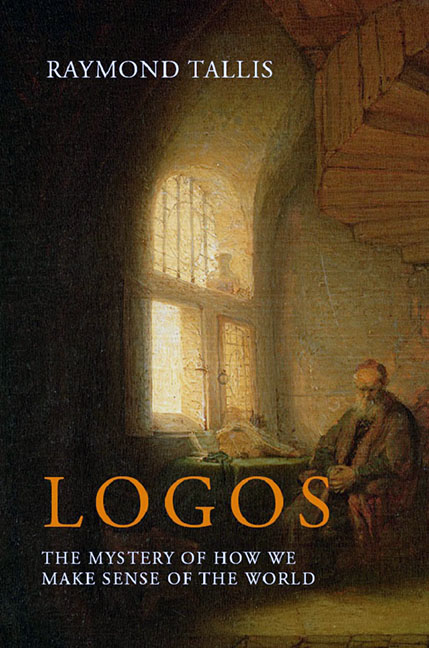Book contents
- Frontmatter
- Dedication
- Contents
- Acknowledgements
- Preface
- Overture
- 1 Seeing the sense-making animal
- 2 Logos: a brief backward glance
- 3 Deflating the mystery 1: putting the world inside the mind
- 4 Deflating the mystery 2: logos as bio-logos
- 5 The escape from subjectivity
- 6 Thatter: knowledge
- 7 Senselessness at the heart of sense
- 8 Towards a complete comprehension of the world?
- Coda
- Notes
- References
- Index
2 - Logos: a brief backward glance
Published online by Cambridge University Press: 09 August 2023
- Frontmatter
- Dedication
- Contents
- Acknowledgements
- Preface
- Overture
- 1 Seeing the sense-making animal
- 2 Logos: a brief backward glance
- 3 Deflating the mystery 1: putting the world inside the mind
- 4 Deflating the mystery 2: logos as bio-logos
- 5 The escape from subjectivity
- 6 Thatter: knowledge
- 7 Senselessness at the heart of sense
- 8 Towards a complete comprehension of the world?
- Coda
- Notes
- References
- Index
Summary
The irreducible knottiness of the present investigation will be apparent from its most succinct characterization: to make sense of the fact that we make sense of the world; or to make better sense of the fact that we progress (or seem to progress) towards better sense of the world. Thus characterized, it wears on its sleeve the impossibility it has in common with many philosophical inquiries. Trying to understand time notwithstanding that we are temporal beings, endeavouring to characterize the stuff of the universe of which we ourselves are a part, or consciously striving to get an outside view of consciousness – these seem equally self-undermining projects.
The present engagement with the enigma of the sense-making animal is a late entry into a very long conversation that has engaged innumerable thinkers approaching the matter from a variety of starting points. It may therefore be helpful to glance back at some ways in which the intelligibility of the world has been viewed. It is salutary to be aware of the struggles of those who have gone before us.
What follows is not a scholarly inquiry. I am not sufficiently deluded to imagine that I can do justice to such a vast and complex aspect of our cognitive past; even less deepen our understanding of it. It has the more modest aim of placing in a wider context the present attempt to get to grips with the fact that our minds seem to make more sense of more of the universe than one might reasonably expect. The mysterious, even miraculous, relationship between our individual and collective intelligence and the seemingly intelligible order of the world is one that has exercised some of the most luminous minds. While the focus in this book will be secular, some of the most influential and profound responses to the mystery of intelligibility have involved a third party – God – mediating between mind and world and He will dominate in the present chapter.
Logos lies at the heart of the attempt to understand human understanding. The word (term, concept, idea) has waymarked a long journey of self-reflection weaving between religious and secular attempts to understand our understanding.
- Type
- Chapter
- Information
- LogosThe Mystery of How We Make Sense of the World, pp. 31 - 52Publisher: Agenda PublishingPrint publication year: 2018



